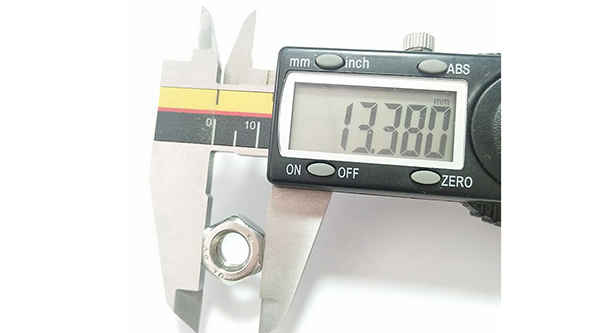What is the tolerance range of precision screws?
What is the tolerance range of precision screws?
Service Hotline
+86760-8787 8587We have more than ten years of production experience in the screw industry, the main products are: iron expansion bolts, auto parts fastener bolts, plastic nylon hexagon socket bolts, DIN934304316 screws, large brim blind rivets, mask machine threading through-hole screws, T-slots Use screws, thick nuts, DIN934 screws, non-standard washers, GB812, semi-circle torx bolts, copper embedded parts, camera tripods, copper hexagon head screws and other fasteners, due to different product materials and specifications, the price is also different, please contact us if necessary.


The manual dismantling of the rivets of the automobile frame delays the production cycle of the product and increases various production costs, so a special tooling is desperately needed to meet the actual needs.

The side wall of the bolt hole is threaded, and the top of the nut is provided with several flattening notches. According to the locking nut of the preferred embodiment of Guangdong Yueluo Hardware Industry Co., Ltd., the number of flattening notches is three. Due to the above features, the three flattening notches can be used as the focal point of the tightening tool, and the


Stainless steel screws do not necessarily corrode and rust, but that stainless steel screws have a stronger ability to withstand corrosion and rust than iron screws. But stainless steel screws can still rust under certain circumstances. So under what conditions are stainless steel screws prone to rust! What is the cause of rust? Stainless steel screws have better characteristics, strong corrosion resistance, high temperature resistance, and strong rust resistance. But it will rust in harsh environments. For example, stainless steel screws are exposed to the sun and the wind every day under very humid conditions. Over time, it will definitely rust a little. For example, in contact with some acid-base chemicals to cause chemical reactions. cause corrosion and rust. There are also bad stainless steel screws, such as stainless steel SUS201 screws used in seawater. Due to long-term immersion, SUS201 stainless steel screws themselves are not suitable for use in salty seawater. cause corrosion and rust. For the use of marine products, it is generally recommended to use stainless steel SUS316 screws, because 316 stainless steel screws have better performance such as corrosion resistance. From the above, it can be concluded that stainless steel screws will still corrode and rust under certain circumstances. Therefore, this requires the rational use of stainless steel screws. Use stainless steel screws of different materials in different situations. And in different occasions, when using stainless steel screws, special attention is also required, and some details need to be considered more. Try to control the corrosion and rust of stainless steel screws as much as possible.

In the manufacture of fasteners, the correct selection of fastener materials is an important part, because the performance of fasteners is closely related to its materials. If the material is improperly or incorrectly selected, the performance may not meet the requirements, the service life may be shortened, or even accidents or processing difficulties may occur, and the manufacturing cost will be high. Therefore, the selection of fastener materials is a very important link. Cold heading steel is a steel for fasteners with high interchangeability produced by cold heading forming process. Because it is formed by metal plastic processing at room temperature, each part has a large amount of deformation and a high deformation speed. Therefore, the performance requirements of cold heading steel raw materials are very strict. On the basis of long-term production practice and user research, combined with GB/T6478-2001 Technical Conditions for Cold Heading and Cold Extrusion Steel GB/T699-1999 High-Quality Carbon Structural Steel and target JISG3507-1991 Cold Heading Characteristics of Carbon Steel Wire Rod for Steel, taking the material requirements of grade 8.8 and grade 9.8 bolts and screws as an example, the determination of various chemical elements. If the C content is too high, the cold formability will be reduced; if it is too low, the mechanical properties of the parts cannot be met, so it is set at 0.25% - 0.55%. Mn can improve the permeability of steel, but adding too much will strengthen the matrix structure and affect the cold forming performance; when the part is quenched and tempered, it has the tendency to promote the growth of austenite grains, so it should be appropriately improved on the basis of international standards. 0.45 % - 0.80 %. Si can strengthen the ferrite and reduce the cold formability. SP is an impurity element, and their existence will cause segregation along the grain boundary, resulting in the embrittlement of the grain boundary and damage to the mechanical properties of the steel. It should be reduced as much as possible. B. The maximum value of boron content is 0.005%, because although boron element can significantly improve the permeability of steel, it will also increase the brittleness of steel. Excessive boron content is very unfavorable for workpieces such as bolts, screws and studs that require good comprehensive mechanical properties.

The above content is uploaded by Yueluo or the Internet. If there is any copyright issue, please contact [email protected].

What is the tolerance range of precision screws?

How to choose the right stainless steel screw manufacturer?

Why is there an R angle under the head of the hexagon head s...

We have more than ten years of production experience in the ...

We have more than ten years of experience in the production ...

We have more than ten years of experience in the production ...

We have more than ten years of experience in screw industry ...